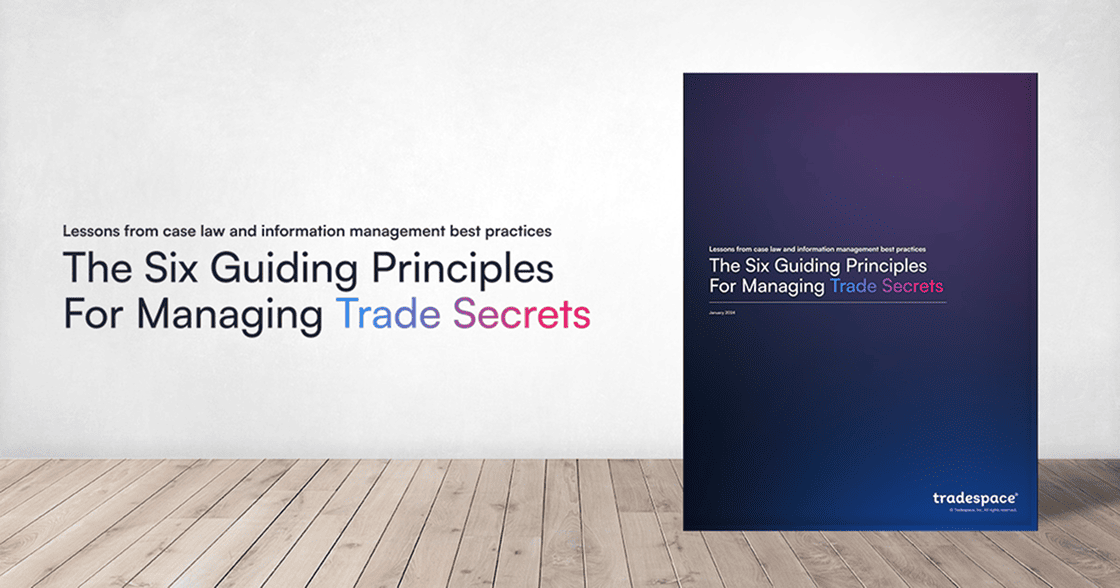An interview with Tradespace’s VP of Strategy on doing, not just creating, IP
October 17, 2024 | 4 min readI usually talk about what I’m seeing externally on my blog, but for this post I’m highlighting a conversation I had recently with one of Tradespace’s greatest internal resources. That resource is Justin Rerko, our VP of Strategy & Business Development. Justin isn’t just an IP veteran, but a corporate leader who’s experienced in growing lines of business and driving transformation. He brings invaluable insight into the intersection between IP and business to our team and customers, as you’ll see.
AS: Something we get to do a lot at Tradespace is talk to folks in the industry. What is it that you hear the most often out there?
JR: The biggest thing I hear from IP people is about the problem of getting disclosures. Across industry and academia, I consistently hear that inventors are reluctant to engage with IP, which means the IP machine doesn’t have the input it needs to work.
AS: What’s your advice for getting more disclosures, aside from using AI?
JR: It’s very typical for legal departments to be perceived as the “Office of ‘No’.” My advice is to be proactive about changing this perception. People need to be willing to take the time to interact with you — the success of the company depends on it. Instead of waiting for people to call you, get out there, meet people, and build relationships.
Some of the best ways I’ve seen IP people doing this — both at Tradespace and from my days as a Big 4 consultant — are attending R&D review or budget meetings and getting to know the company’s most productive inventors. For university IP teams, that would look like going out and giving IP talks and paying attention to which researchers are getting grant money.
AS: What would you say working at Tradespace has taught you about IP, if anything?
JR: Two things: I continue to be amazed at how much IP departments struggle to get the company to understand and care about what they do. IP is so important, yet the average IP attorney has to really sing for their supper — people don’t just automatically get IP or find it interesting. It’s a phenomenon that’s as pervasive as it is unfortunate.
The other thing is gaining even more appreciation for how incredibly difficult it is to do the job of IP well. Look at IP for the automotive industry, for example. Things are just fine for 100 years, and all of a sudden, car companies are getting sued by cell phone companies. When you’re an IP attorney, your job is not just to crank out patents, but to be a strategic advisor and operator for the business: anticipate internal and external risks to the business, keep people aware of them, manage them, and manage expectations. It’s hard to play both offense and defense like this, and it’s only getting harder as more technologies converge.
AS: How have you learned about the business side of IP over the course of your career?
JR: When I was at the Big 4, I was exposed to the company’s massive and very high-performing risk management department. That was something I had never seen before and it was really critical to my training as a business partner. From them, I learned that risk management is a verb, not a noun. It’s something you have to roll up your sleeves and do. Also at KPMG, I worked with a PhD industrial economist who taught me about what business assets really are and how to think about IP as one, not just a legal right.
AS: Speaking of learning, is there anything IP-related that you’ve changed your mind about over your career?
JR: Everywhere you go in IP, the name of the game is patents, and I used to be like that too. But over the years, I’ve seen enough litigation to realize that patents get invalidated so frequently that you can’t always rely on them. They’re by no means a panacea. So I’ve come to believe in taking a holistic approach to IP that doesn’t exclusively rely on patents but instead layers in protection using trademarks, copyrights, and trade secrets. A lot of the most interesting inventions today aren’t clearly patentable, so this is something companies are going to have to be smarter about going forward.
AS: Another thing we hear a lot from IP teams is that they’re busier than ever before. What advice would you give for managing burnout as an IP professional?
JR: My advice for burnout would be to leverage AI, get creative from a team perspective, and keep investing in new skills. I won’t go into the AI part, but on the team front, just because you can’t get the budget to hire another attorney doesn’t mean there aren’t other options for headcount. One thing I’ve done in the past is bring in a technical writer who was able to take a lot off my plate. I’ve also had a paralegal who I trained in IP and made a massive difference for me. Don’t assume that the people around you can only do one thing. Once I sat down and talked to this paralegal, I found out that she was eager to do more, and we were both really happy when I took her up on that.
Though it may feel like you don’t have time to learn new skills, doing so lets you tackle your problems in a different way, which tends to be re-inspiring. Taking a few executive classes or partnering with a new-to-you division in your company might just be exactly what you need to keep things feeling fresh.
AS: On the AI piece, what would you do if you were working somewhere that’s resistant to AI?
JR: That could definitely be possible because there is absolutely not a uniform response to AI. Some customers can’t wait and some customers are a “hell no” to adopting it. In working with the latter, my advice would be not to avoid the topic. I’d do everything I could to educate my colleagues with research and analysis. And I’d use the framing that legal departments are often the first to get cut when times are tough. We can partner with the business to proactively look for ways to save money and improve outcomes (which AI does), or they’ll do it for us.
Read more of Justin’s first principles thinking on IP on his blog here.



